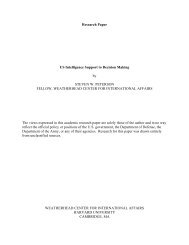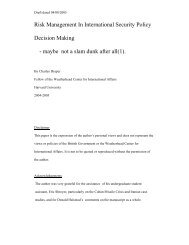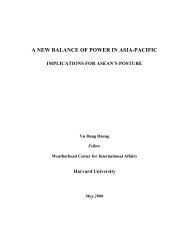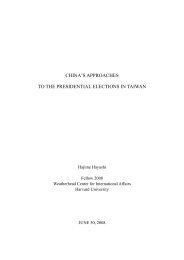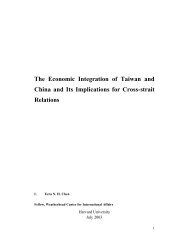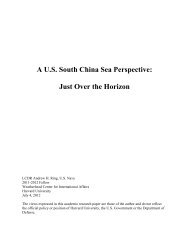A U.S. South China Sea Perspective: Just Over the Horizon
A U.S. South China Sea Perspective: Just Over the Horizon
A U.S. South China Sea Perspective: Just Over the Horizon
Create successful ePaper yourself
Turn your PDF publications into a flip-book with our unique Google optimized e-Paper software.
The same narrative seemed to play again in <strong>the</strong> Spratlys in 1988 when Vietnam attempted<br />
to plant a flag on Johnson <strong>South</strong> Reef (where only a few rocks are visible at high tide) in<br />
response to <strong>the</strong> Chinese building observation stations in <strong>the</strong> area. <strong>China</strong> reacted with force, and<br />
<strong>the</strong> skirmish between six small vessels ended with <strong>the</strong> deaths of over seventy Vietnamese<br />
soldiers and sailors. Parts of <strong>the</strong> incident were filmed and grainy footage can be viewed on<br />
YouTube. 34 The video shows Vietnamese soldiers standing on Johnson <strong>South</strong> Reef (waist deep<br />
in water) and being mowed down by heavy machine gun fire from one of <strong>the</strong> Chinese vessels.<br />
Throughout <strong>the</strong> intervening years, incidents involving fishing and coast guard vessels have<br />
continued, maintaining, if not escalating <strong>the</strong> tensions between Vietnam and <strong>China</strong>. Like <strong>the</strong><br />
Philippines, <strong>China</strong>’s interaction with Vietnam in <strong>the</strong> <strong>South</strong> <strong>China</strong> <strong>Sea</strong> took on a new dimension<br />
when it threatened Vietnam’s economic development.<br />
In 2004, Vietnam began to announce joint ventures with foreign oil companies and public<br />
bidding on oil exploration in <strong>the</strong> <strong>South</strong> <strong>China</strong> <strong>Sea</strong>. The Chinese Foreign Ministry consequently<br />
released statements that expressed concern over Vietnam’s attempts to violate its sovereignty.<br />
<strong>China</strong> even warned international petroleum companies to “cease to do anything that would<br />
impair <strong>China</strong>’s sovereign rights and maritime rights and interests.” 35 In 2008, Chinese diplomats<br />
met with ExxonMobil executives in response to a signed agreement with <strong>the</strong> Vietnamese state-<br />
owned company PetroVietnam. The Chinese diplomats explained that <strong>the</strong> project was a breach of<br />
Chinese sovereignty and that if ExxonMobil continued to work with Vietnam, its future business<br />
on <strong>the</strong> Chinese mainland could be threatened. 36 British Petroleum also ceased exploration off <strong>the</strong><br />
coast of Vietnam. The company stated it sold those assets to help pay for <strong>the</strong> Gulf of Mexico<br />
spill, but some analysts believe it was at least partly due to threats from <strong>the</strong> Chinese<br />
government. 37 At <strong>the</strong> end of May 2011 Vietnam accused Chinese fishing vessels of deliberately<br />
24



